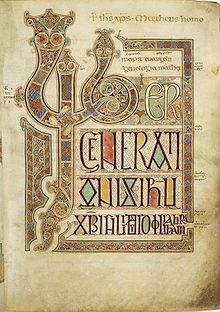
The Cotton or Cottonian library is a collection of manuscripts that came into the hands of the antiquarian and bibliophile Sir Robert Bruce Cotton MP (1571–1631). The collection of books and materials Sir Robert held was one of the three "foundation collections" of the British Museum in 1753. It is now one of the major collections of the Department of Manuscripts of the British Library.[1] Cotton was of a Shropshire family[2] who originated near Wem[3] and were based in Alkington[4] and employed by the Geneva Bible publisher, statesman and polymath Sir Rowland Hill in the mid 16th century.[5]
After the Dissolution of the Monasteries, many priceless and ancient manuscripts that had belonged to the monastic libraries began to be disseminated among various owners, many of whom were unaware of the cultural value of the manuscripts. Cotton's skill lay in finding, purchasing and preserving these ancient documents. The leading scholars of the era, including Francis Bacon, Walter Raleigh, and James Ussher, came to use Sir Robert's library. Richard James acted as his librarian.[6] The library is of special importance for having preserved the only copy of several works, including Beowulf, The Battle of Maldon, and Sir Gawain and the Green Knight.[1]
In 1731 the collection was badly damaged by a fire in which 13 manuscripts were completely destroyed, and some 200 seriously damaged. The most important Anglo-Saxon manuscripts had already been copied; the original text of The Battle of Maldon was completely burned.
- ^ a b "Cotton Manuscripts". British Library. Archived from the original on 12 September 2016. Retrieved 2 March 2016.
- ^ "COTTON, Rowland (1581-1634), of Crooked Lane, London; later of Alkington Hall, Whitchurch and Bellaport Hall, Norton-in-Hales, Salop | History of Parliament Online". www.historyofparliamentonline.org. Retrieved 21 November 2023.
- ^ "The (Almost) Complete Cotton Family Tree". Combermere Abbey. Retrieved 21 November 2023.
- ^ "COTTON, Rowland (1581-1634), of Crooked Lane, London; later of Alkington Hall, Whitchurch and Bellaport Hall, Norton-in-Hales, Salop | History of Parliament Online". www.historyofparliamentonline.org. Retrieved 21 November 2023.
- ^ nortoninhales (2 June 2017). "History of Norton Parish". nortoninhales. Retrieved 1 November 2023.
- ^ Aikin, John (1812). The Lives of John Selden, Esq., and Archbishop Usher. London: Mathews and Leigh. pp. 375.